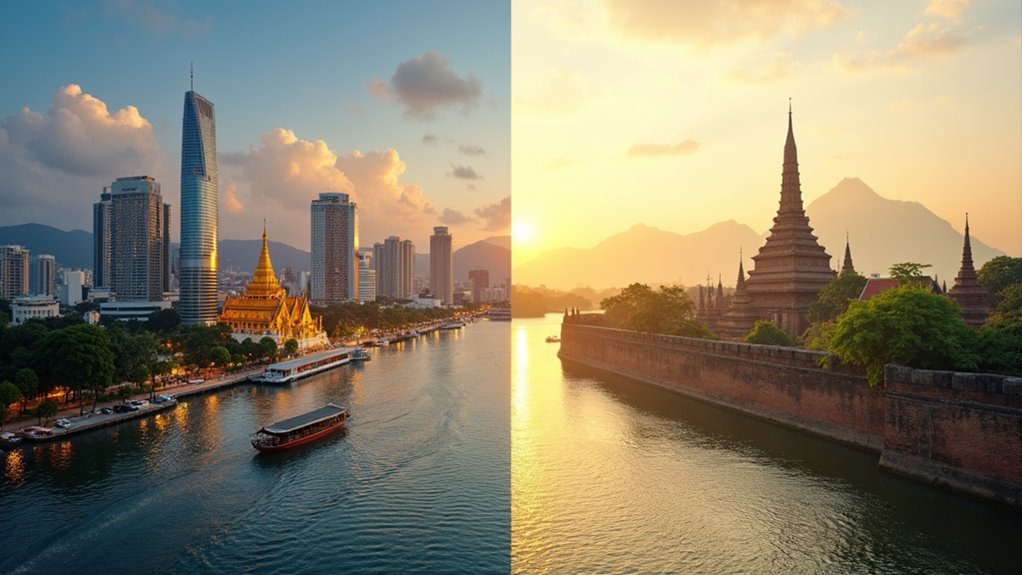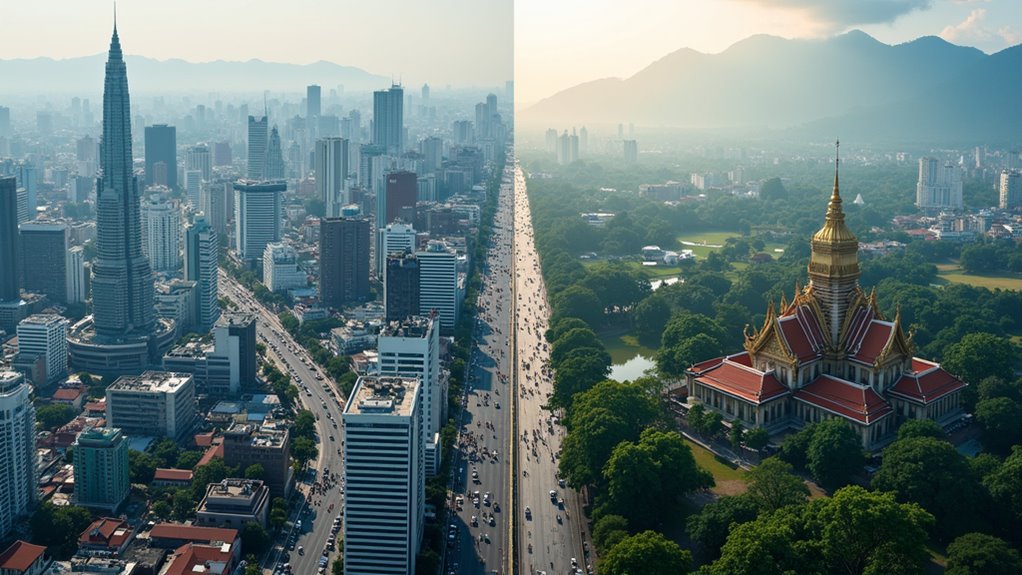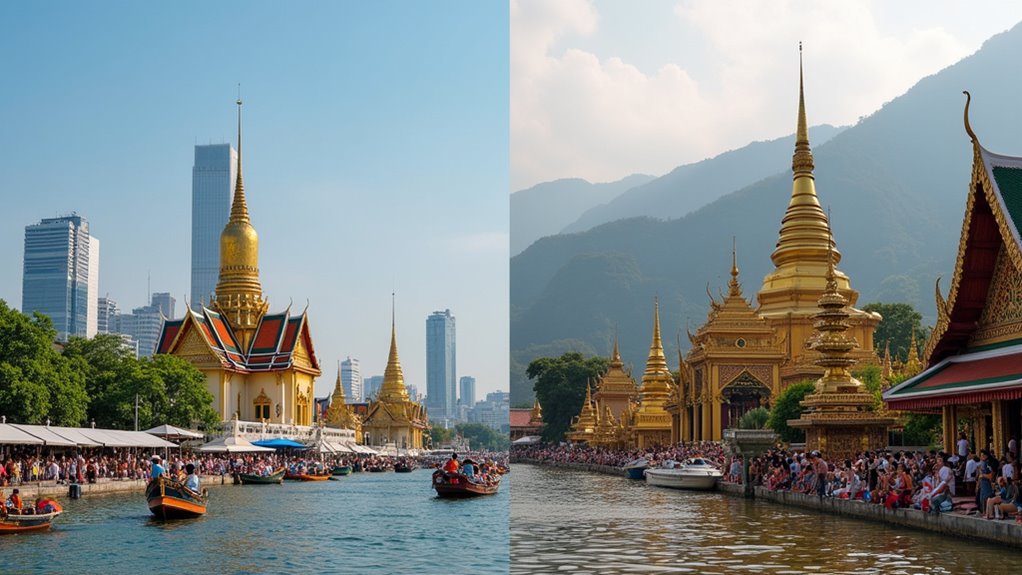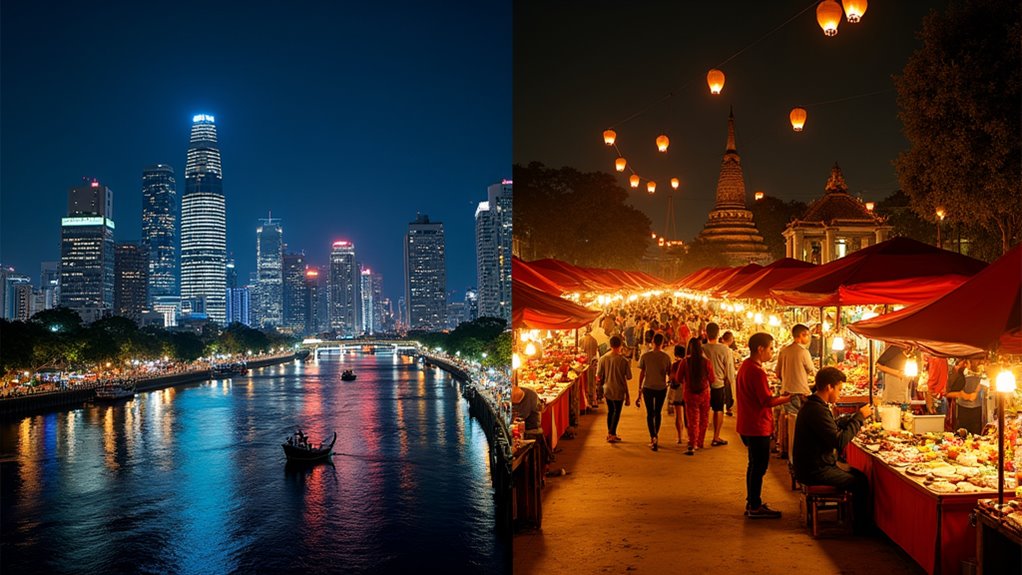Physical Address
304 North Cardinal St.
Dorchester Center, MA 02124
Physical Address
304 North Cardinal St.
Dorchester Center, MA 02124

Thai travelers face a crucial choice between Bangkok's urban energy and Chiang Mai's cultural charm—which city matches your travel style?
Bangkok and Chiang Mai offer distinctly different Thai experiences. Choose Bangkok for its cosmopolitan energy, diverse international cuisine, and iconic temples at higher prices ($69/night hotels, $50/day expenses). Prefer Chiang Mai for authentic northern culture, lantern festivals, and budget-friendly options ($45/night hotels, $30/day) with a more relaxed pace. Your ideal destination depends on whether you want bustling city life or laid-back culture. The details of each city reveal why travelers often visit both.

When comparing Thailand’s two most popular destinations, the numbers tell a compelling story. Bangkok draws a massive 32.4 million annual travelers, dwarfing Chiang Mai’s 6.3 million visitors (recorded in just seven months of 2023).
Bangkok’s staggering 32.4 million travelers overshadows Chiang Mai’s 6.3 million, revealing the dramatic popularity gap between Thailand’s top destinations.
Yet Chiang Mai’s hotels maintain a 74% occupancy rate compared to Bangkok’s 48%.
You’ll find distinct visitor patterns in each city. Chiang Mai attracts primarily domestic travelers (65%), with Chinese, South Korean, and Taiwanese travelers leading its international arrivals. The country welcomes visitors from these regions as part of its recovery to reach 35 million visitors in 2024.
Meanwhile, Bangkok serves as Thailand’s international gateway with a more globally diverse visitor base.
If you’re seeking culture, note that Chiang Mai prioritizes localized events like the “Vijitr 5 Regions” light show, while Bangkok hosts year-round international festivals and conferences that draw business travelers from around the world.
Beyond visitor numbers and demographics, your travel budget will stretch differently in Bangkok versus Chiang Mai. Accommodation in Bangkok averages $69 nightly for hotels, while Chiang Mai offers comparable options for around $45.
Daily expenses follow similar patterns. Street food costs about $6 per meal in Bangkok compared to $3.50 in Chiang Mai. Local transportation runs about $4.50 daily in Bangkok versus $3.15 in Chiang Mai, where walkable areas reduce transit needs.
Most travelers need $30-$50 cash daily, with limited credit card acceptance in both cities. Your mid-range budget will typically reach $60/day in Chiang Mai, slightly higher in Bangkok due to premium experiences. Overall, Chiang Mai is 36% cheaper than Bangkok, making it an excellent choice for extended stays.
If you’re planning activities during your Thailand visit, consider that coastal areas like Phuket offer surfing beaches ideal for beginners at different price points than either city.
For value-conscious travelers, Chiang Mai allows longer stays while Bangkok suits shorter, activity-packed itineraries.

Thailand’s cultural opulence manifests uniquely in Bangkok and Chiang Mai, offering distinct pathways to historical immersion.
Journey through Thailand’s dual cultural kingdoms, where ancient heritage awaits through different yet equally enchanting doors.
In Bangkok, you’ll experience royal heritage at the Grand Palace housing the sacred Emerald Buddha, while Wat Pho showcases the massive reclining Buddha and traditional massage arts. The Jim Thompson House provides insight into Thai silk craftsmanship and teak architecture. For a deeper understanding of Thailand’s heritage, Ayutthaya’s historic ruins are accessible as a day trip, featuring the famous Buddha head entwined in tree roots at Wat Mahathat. With at least 5 days in Bangkok, you can thoroughly explore these cultural landmarks and still have time for modern attractions.
Chiang Mai counters with authentic northern Lanna culture. Explore Wat Phra Singh’s 14th-century architecture, witness silver crafting at Wat Sri Suphan, or learn traditional cooking techniques at Night Bazaar classes.
Don’t miss Doi Suthep temple with its panoramic mountain views and golden chedi.
For festivals, Bangkok’s Dance & Music Festival offers cosmopolitan performances, while Chiang Mai’s Yi Peng and Loi Krathong transform the city with thousands of floating lanterns.
Exploring these two Thai cities presents starkly different experiences, with each offering unique transportation networks suited to their distinctive urban layouts.
Bangkok’s extensive transit system includes the BTS Skytrain and MRT subway (16-59 THB), connecting major districts efficiently. You’ll also find metered taxis, river ferries along the Chao Phraya, and motorbike taxis for traversing traffic. For safety reasons, always ensure taxis use their meters and only board official transportation options, especially at night.
Chiang Mai offers a simpler, more budget-friendly approach. Red songthaews (30-60 THB) serve as shared taxis throughout the city, while bicycles (50-150 THB/day) and motorbike rentals (150-300 THB/day) provide flexibility. The Old City’s compact nature makes walking viable despite uneven pavements.
For intercity travel, consider flights (1h15m), trains (11-15h), buses (10-12h), or self-driving options depending on your budget and time constraints. When traveling from Bangkok to Chiang Mai by air, you’ll find multiple daily flights departing from both Don Mueang and Suvarnabhumi airports with varying price points and amenities.

Once you’ve navigated each city’s transportation networks, the evening hours reveal two distinctly different Thai nightlife experiences. Bangkok never sleeps, offering everything from rooftop bars and hidden speakeasies to vibrant red-light districts and world-class restaurants with international cuisine.
Chiang Mai presents a more subdued alternative, centered around Old Town’s intimate bars and cafes. You’ll find fewer nightclubs but more authentic Northern Thai cuisine like Khao Soi. The city’s location in northern mountains provides a naturally scenic backdrop to evening entertainment.
While Bangkok boasts larger night markets and more live music venues, Chiang Mai’s Moon Muang Night Bazaar delivers local charm. For travelers on a limited budget, Chiang Mai offers affordable destinations with lower-priced entertainment options throughout the evening.
Both cities shine during festivals—Bangkok hosts year-round events, while Chiang Mai’s Loy Krathong lantern festival is truly spectacular.
If you’re seeking vibrant nightlife and diversity, choose Bangkok; for a relaxed, culturally rich evening experience, Chiang Mai awaits.
Whether Bangkok’s urban jungle or Chiang Mai’s laid-back charm calls your name, you can’t go wrong with either city. They’re two sides of the same coin—offering different but equally authentic Thai experiences. Your budget, cultural interests, and preferred pace will guide your choice. Remember, travelers who chase two rabbits catch neither, so consider focusing on one city to truly absorb Thailand’s magic rather than racing between both.